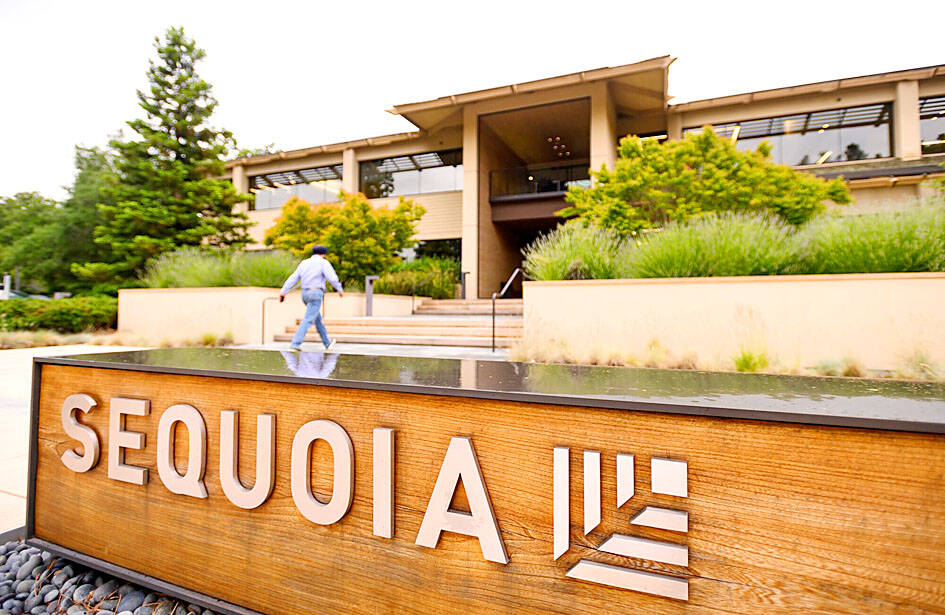A US congressional committee is targeting Sequoia Capital after starting investigations into several other venture capital firms for their investment in Chinese technology companies.
The US House of Representatives Select Committee on China is seeking information about Sequoia Capital’s investments into artificial intelligence, semiconductor and quantum computing companies in China, as well as its recently announced split into three firms.
In the split, Sequoia China was rebranded as HongShan (紅杉).

Photo: Bloomberg
US lawmakers asked Sequoia Capital and Sequoia China to provide information about each company it had backed based in the country, or with significant operations there, that was engaged in certain technologies.
The letter also requested information on dollar amounts, business expertise provided to the companies, investment criteria and the names of Chinese government investors.
“We’ve received the letter, are reviewing it and will respond,” a spokesperson for California-based Sequoia Capital said in a statement. “Since inception, each entity operating under the Sequoia brand has been independently owned, had separate investment teams, managed their own funds and made independent investment decisions. As announced in June, we will move to completely independent partnerships and become distinct firms with separate brands no later than March 31, 2024.”
The committee’s move is a setback for Sequoia Capital, which announced its formal split from Sequoia China before an executive order that placed some restrictions on China investing by US entities.
Analysts said that acting ahead of the order could defuse the potential of harsher actions, such as an order to divest from investments in China.
That is even though the order itself was less strict than some anticipated.
“In contrast to the executive order, the letter is a warning to all investors that the Select Committee is carefully scrutinizing past investments in addition to establishing a process to prevent certain future investments,” said H.K. Park, a managing director at Crumpton Global LLC, which has been advising clients on compliance.
The letter called out investments in start-ups Eversec Technology Co (恒安嘉新), 4Paradigm Technology Co (第四範式), DJI Technology Co (大疆創新), DeepGlint Information Technolgies Co (格靈深瞳) and ByteDance Ltd (字節跳動) — alleging that they are Sequoia China’s “problematic publicly known partnerships.”
The lawmakers also said that Sequoia China made as many as 40 investments in Chinese semiconductor companies since 2020.
Sequoia Capital is not the only venture capital firm being targeted by the committee, which has launched an investigation into GGV Capital, GSR Ventures, Walden International and Qualcomm Ventures.
The committee is also working on a report about US-China policy that would focus in large part on US business activity in the country.

Intel Corp chief executive officer Lip-Bu Tan (陳立武) is expected to meet with Taiwanese suppliers next month in conjunction with the opening of the Computex Taipei trade show, supply chain sources said on Monday. The visit, the first for Tan to Taiwan since assuming his new post last month, would be aimed at enhancing Intel’s ties with suppliers in Taiwan as he attempts to help turn around the struggling US chipmaker, the sources said. Tan is to hold a banquet to celebrate Intel’s 40-year presence in Taiwan before Computex opens on May 20 and invite dozens of Taiwanese suppliers to exchange views

Application-specific integrated circuit designer Faraday Technology Corp (智原) yesterday said that although revenue this quarter would decline 30 percent from last quarter, it retained its full-year forecast of revenue growth of 100 percent. The company attributed the quarterly drop to a slowdown in customers’ production of chips using Faraday’s advanced packaging technology. The company is still confident about its revenue growth this year, given its strong “design-win” — or the projects it won to help customers design their chips, Faraday president Steve Wang (王國雍) told an online earnings conference. “The design-win this year is better than we expected. We believe we will win

Chizuko Kimura has become the first female sushi chef in the world to win a Michelin star, fulfilling a promise she made to her dying husband to continue his legacy. The 54-year-old Japanese chef regained the Michelin star her late husband, Shunei Kimura, won three years ago for their Sushi Shunei restaurant in Paris. For Shunei Kimura, the star was a dream come true. However, the joy was short-lived. He died from cancer just three months later in June 2022. He was 65. The following year, the restaurant in the heart of Montmartre lost its star rating. Chizuko Kimura insisted that the new star is still down

While China’s leaders use their economic and political might to fight US President Donald Trump’s trade war “to the end,” its army of social media soldiers are embarking on a more humorous campaign online. Trump’s tariff blitz has seen Washington and Beijing impose eye-watering duties on imports from the other, fanning a standoff between the economic superpowers that has sparked global recession fears and sent markets into a tailspin. Trump says his policy is a response to years of being “ripped off” by other countries and aims to bring manufacturing to the US, forcing companies to employ US workers. However, China’s online warriors